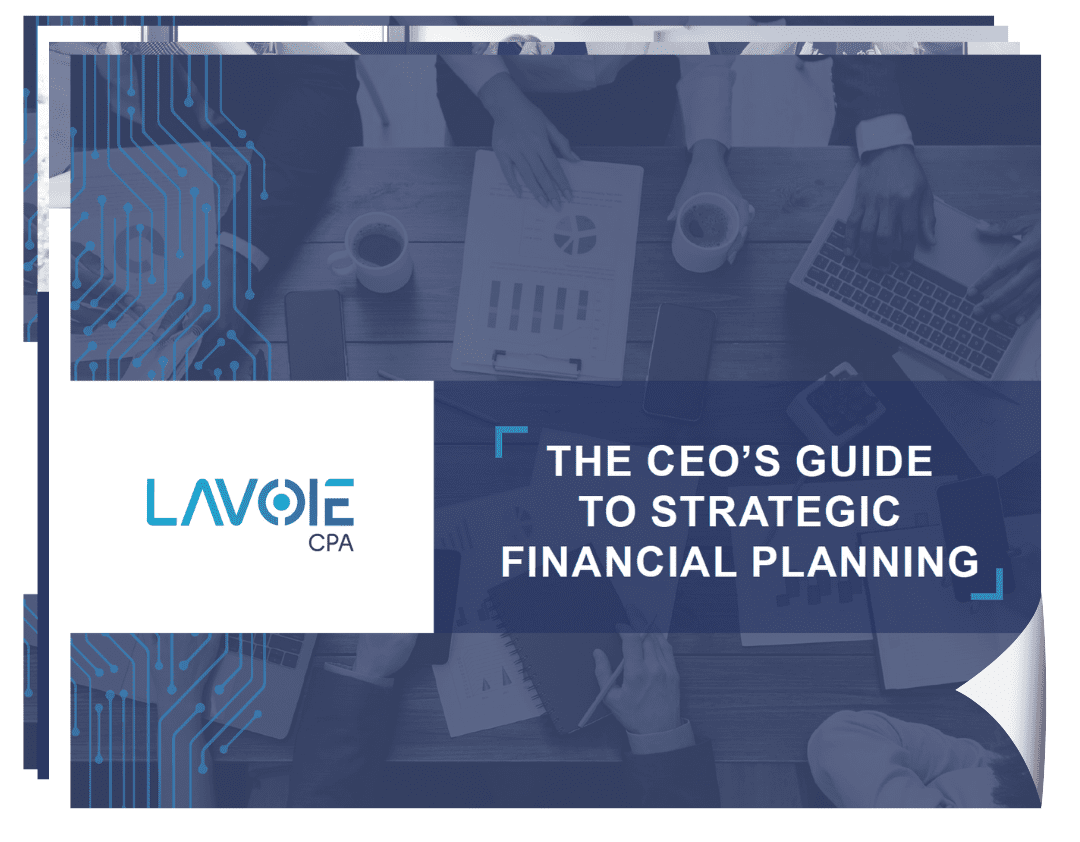
by Sharai Lavoie | Sep 24, 2025 | Competitive Advantage, Finance
In moments that matter, whether it’s a potential acquisition, investor outreach, or board presentation, leadership teams are often asked to respond quickly, with accuracy and confidence. But for many companies, these moments cause strain. Reports take too long to generate. Numbers don’t reconcile. Teams aren’t aligned.
At Lavoie CPA, we help businesses remove that friction entirely. We partner with leadership teams to implement operational systems that support fast, confident decision-making, without pausing or disrupting the business. The result is not just faster turnaround; it’s a competitive edge rooted in financial readiness.
How Prepared Companies Stay Ahead
Companies that consistently lead in high-stakes moments aren’t just reacting better; they’re operating differently every day. Their readiness isn’t circumstantial; it’s systemic.
Here’s what sets them apart:
- Up-to-Date, Reconciled Financials – They don’t wait until a deal is on the table to clean up the books. Regular monthly reconciliations keep financials accurate, timely, and ready for investor-grade review, at a moment’s notice.
- Current and Accessible Data Rooms – Prepared teams maintain their data rooms as living documents, not static folders. Contracts, KPIs, policies, and investor materials are continuously updated, so there’s no scramble when due diligence begins.
- Connected Systems and Unified Data – Their accounting and CRM platforms talk to each other. That means sales forecasts, revenue models, and board reporting all pull from the same, accurate source, avoiding the time lost reconciling conflicting versions.
- Cross-Functional Collaboration – Sales, finance, and operations don’t operate in silos. They follow a rhythm of shared reporting and joint planning, which prevents misalignment and builds internal trust.
The net result? When a board request or investor inquiry arrives, these companies don’t have to “get ready.” They already are.
What Lavoie CPA Helps You Build (and How)
We’ve seen too many companies lose time, deals, or valuation because their internal systems couldn’t keep up with external opportunities. That’s why our approach focuses on building infrastructure that supports speed, clarity, and resilience.
Here’s how we do it:
1. Financials That Are Always Deal-Ready
Rather than waiting for year-end or major events, we help clients implement monthly close and reconciliation processes. This means your numbers are never more than a few weeks old, and they’re always audit-ready, accurate, and aligned with how you present your business to investors or buyers. No need to pull late nights reworking spreadsheets or searching for backups.
2. CRM-to-Finance Integration for Real-Time Insight
Your pipeline data shouldn’t live in isolation from your financial data. We help clients connect CRM and accounting systems in ways that make revenue projections, cash flow models, and investor presentations easy to generate and easy to trust. This ensures alignment between what sales is saying, what finance is reporting, and what leadership is deciding.
3. Proactive, Not Reactive, Document Management
We work with clients to establish documentation routines that keep contracts, metrics, cap tables, and policy files up to date on a regular cadence. This includes building and maintaining data room structures that reflect your business today, not last quarter. When diligence begins, you’re already positioned to respond confidently.
4. A Cadence of Collaboration
Processes matter, but so does communication. We facilitate monthly and quarterly syncs across departments to review forecasts, reconcile assumptions, and adjust as needed. This structure prevents misalignment and ensures every team is working from the same strategic narrative.
Why It Pays Off, Every Day, Not Just in Deals
A readiness mindset doesn’t just help you when something big happens. It improves how your business operates every day.
- Shorter Due Diligence Cycles – When everything is in place, buyers and investors can move faster and with more confidence.
- Increased Investor and Board Trust – Consistent, reconciled data builds credibility. It signals that your team knows what’s happening in the business at all times.
- Stronger Negotiation Leverage – Prepared companies aren’t just reacting to offers. They’re proactively shaping the conversation, armed with accurate data and clear narratives.
- Confidence Across the Team – When systems support the team, the team can focus on strategy, not cleanup. That confidence radiates across the organization.
Be the Company That’s Always Ready
You don’t need to wait for the next big ask to start preparing. In fact, the companies that do best in high-pressure situations are the ones that have already done the work to operate with clarity every day.
At Lavoie CPA, we help leadership teams build the cadence, structure, and financial visibility they need to act strategically, without slowing down. Whether you’re planning for growth, considering funding, or just want to improve internal alignment, we help you get ready and stay ready.
Start the conversation today.

by Sharai Lavoie | Jan 10, 2022 | Competitive Advantage
Economic uncertainties continue to plague the United States due to the Delta Covid variant. According to a September 2021 Wall Street Journal article, “In recent weeks many economists lowered their forecasts for third-quarter economic growth . . . amid the spread of the highly contagious Delta [Covid] variant.”
For early-stage, high-growth businesses and private equity firms, the challenge of navigating economic downturns has rarely been more prolonged and confusing. Extraordinary supply and demand challenges brought about by the pandemic have made it very difficult for businesses and private equity firms to manage and report their finances as well as to predict future business performance.
One of the solutions many businesses and private equity firms are moving to is an outsourced accounting service. Outsourced accounting services offer highly integrated and technologically advanced solutions for weathering the accounting and finance storms brought about by the current economic downturn.
Here is a closer look at 3 ways an outsourced accounting firm helps businesses and private equity firms during an economic downturn:
1. Providing Reporting and Analytics That Are Up to Date
One of the challenges presented by economic downturns is the speed at which changes occur. Negative surprises brought about by an economic downturn can have immediate effects on business performance and financial results. A difficulty arises in these cases when business and financial reporting is lagging.
For example, if you are a large catering equipment manufacturer and pandemic policies have suddenly closed buffets and catering events, you need up-to-date reporting quickly so that you can forecast how these policy decisions will affect your future revenues. If your financial reporting system typically takes a month or more to complete, you will be left flying blind in your decision-making as to how to react to these policy decisions.
Outsourced accounting firms leverage best-in-class software solutions and integrated, real-time analytics to give you accurate reports fast so that you can make informed decisions for your business. With the cutting-edge technology offered by outsourced accounting firms, your critical financial data is no longer siloed but instead is integrated so that you can see how financial performance in one area impacts all other areas of the business.
2. Allowing Businesses to Focus on Growth
For high-growth businesses and private equity firms, it can be difficult to run accounting and finance operations well and grow revenue at the same time. With an outsourced accounting firm, business owners are freed up to focus on growing their businesses knowing that a highly experienced financial management partner is taking care of managing and optimizing the business’s financial and accounting operations.
In an economic downturn, it is critical that businesses and private equity firms spend more time and effort than normal to generate new streams of revenue for the business. In order to have the extra time and resources needed to grow revenue during downturns, business owners may want to consider an experienced outsourced accounting firm to help them during these turbulent economic times.
Outsourced accounting firms are experts in utilizing the latest accounting and finance technology for the benefit of high-growth businesses and private equity firms. Outsourced accounting firms keep up with all the latest developments in accounting and finance software and how they can be best applied to your unique business. By applying these software programs to the financial operations of your business, your business will be better positioned to scale. With a better scale, you will have more time to focus on growing the sales and customer services operations of your business in order to weather the economic downturns.
3. Offering Access to Professional Financial Expertise
With an outsourced accounting firm, you always have access to a qualified controller or fractional CFOs who can provide you with valuable guidance on financial decisions about your business. Many young, high-growth businesses have dynamic sales leaders, product designers and customer service operations, but they do not have experienced and sophisticated finance and accounting teams in-house.
Furthermore, the cost to hire and develop in-house accounting and finance teams can be expensive and time-consuming. With an outsourced accounting service, you have access to an experienced accounting and finance team from day one. Your outsourced accounting service is not only running your accounting and finance operations day-to-day, but they are also there when you need them for any guidance and insights you need about the financial matters of your business.
These outsourced financial experts can help business owners make the best decisions possible about how to allocate and utilize capital during economic downturns. These experts can also help business owners think strategically and plan for how to weather an economic downturn for the next 12-24 months. When an economic downturn is happening, the stakes are much higher for businesses, and it is very important to avoid making unhealthy business decisions.
For example, if you decide to invest in a capital project at the wrong time and then an economic downturn occurs, your business may be left without adequate capital to continue operating and you may be forced to go out of business. Having an expert outsourced accounting partner who knows the exact financial status of your business is an invaluable asset in these situations by preventing you from making an unhealthy business decision during an economic downturn.
As a business owner or private equity firm, you may be looking for ways to reduce expenses during an economic downturn. One of the largest, unexpected expenses for employers is when an employee leaves the company. According to Gallup, the “cost of replacing an individual employee can range from one-half to two times the employee’s annual salary.” Employee turnover expenses can be especially detrimental during a downturn because they are oftentimes unexpected.
With an outsourced accounting firm, you not only have the benefit of scalable financial operations led by proven experts, but you also receive the added benefit of knowing that you will not have unforeseen turnover expenses from accounting and finance employees who leave the company during a downturn like the Covid pandemic. Instead, you will have the constant support of a dedicated outsourced accounting team that knows the financial status of your business inside and out.
Partner With Lavoie
Our outsourced accounting team is here to offer you an accurate assessment of the current financial health of your business. Our team is also here when you need us the most during an economic downturn. We’ll help you decide the best course of action to take to weather the economic storm and return once again into calm waters for your business. To learn more about Lavoie’s outsourced accounting services, please contact us today.

by Sharai Lavoie | Feb 16, 2021 | Accounting, Blog, Budgeting, Business Intelligence, CFO, Community, Competitive Advantage, CPA, Entrepreneurs, Finance, Financial Services, Growth, Lavoie, Planning, Services, Small Business
Developing a strategic financial plan can seem daunting; however, it can be boiled down into two questions: what are you doing now and where do you want to be? This article walks you through the process of answering these two questions, providing a foundation for developing a financial strategy for your organization.
Question 1: What Are You Doing Now?
Every journey has a starting point and an ending point. Before you can implement a plan to achieve your financial goals, it is important to consider where you are now.
Current State of the Numbers
The current state of your organization’s numbers are a good starting point when determining your organization’s capability to meet its financial goals. Some important questions to ask include:
- Are you in a position of stability? Financial stability is vital to reaching “stretch” goals. If the organization is not currently financially stable, it is important to identify this fact and develop a strategy for achieving stability as a first step in the planning process.
- What is actually coming in/out the door? Knowing the size of the company’s cash reserves is not enough for financial planning. How much revenue is coming into the organization and how much is going out again as expenses?
- What is fueling the majority of your expenses? While increasing sales is one way of improving the organization’s financial footing, the ability to do so depends on the market and potential customers. Identifying and minimizing expenses increases profits as well but is less impacted by external factors.
Culture
Achieving financial goals requires the support of the entire organization. Take a moment to consider your organization’s culture and if the company has the maturity and ability to meet its goals.
- Do your decisions match your vision and mission? An organization’s goals and procedures are important, but actions are even more so. Are your decisions, both recent and historical, helping to move the organization towards its goals?
- Would your employees agree? Employees throughout the organization can have different perspectives, insights, and recommendations. Ask those “down in the weeds” how well the company is following its vision and mission and how they believe things could do better.
Question 2: Where Do You Want To Be?
The effectiveness of a strategic plan can only be effectively measured if there are usable metrics. Before starting to build a plan to improve the organization’s financial position, it is necessary to define success and failure.
Targets
The first step in defining “success” for a financial strategy is defining concrete targets. From there, the next question to ask is what do you need to achieve your targets?
- Human Capital. Does your organization have the human capital necessary to achieve its goals? This not only includes headcount but access to the specific skill sets required now and in the future.
- Acquisitions. Does your organization have the capabilities that it requires? Are there areas of your business where things could be done more effectively or efficiently?
- IT Investments. The IT landscape is evolving rapidly, and new solutions have the potential to dramatically improve operational efficiency and effectiveness. Are there any IT investments that the organization should make that would help in reaching its targets?
Expenses
A failure to properly monitor and manage expenses is one of the most common ways that businesses fail to achieve their financial goals. Gaining visibility into past, present, and future expenditures is an essential part of financial planning.
- How can you gain more visibility into your expenditures? Visibility into expenditures is essential to identifying opportunities for optimizations and cost cutting. How can you achieve a higher level of visibility into business operations?
- Do you have an idea of your cash flow on a daily, weekly, and monthly basis? What level of visibility do you currently have into your organization’s cash flows? Examining cash flows at the daily, weekly, and monthly level can help to identify potential inefficiencies and opportunities.
Beginning Your Strategic Financial Plan
Answering the questions that were asked in this article enables you to lay the groundwork for developing your organization’s financial strategy. To learn about the next steps in your financial planning process, download the CEO’s Guide to Strategic Financial Planning.




